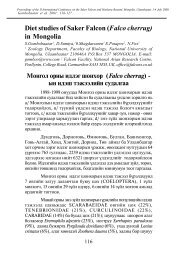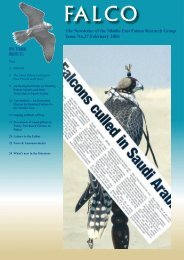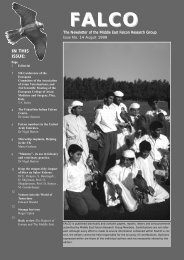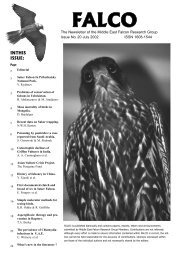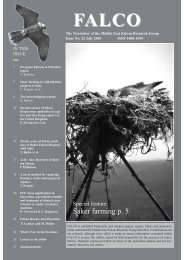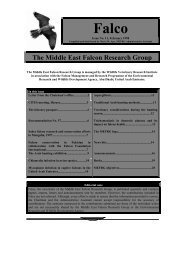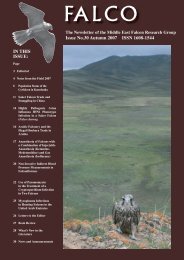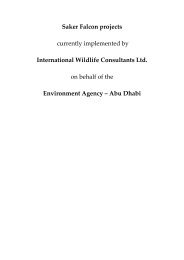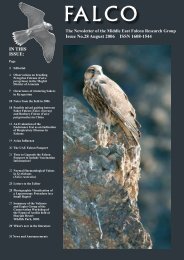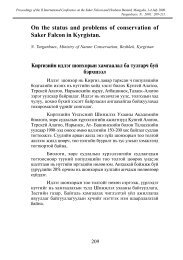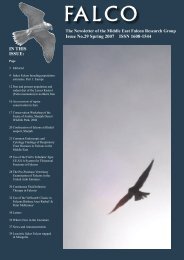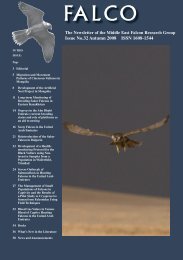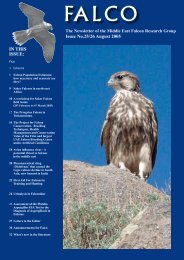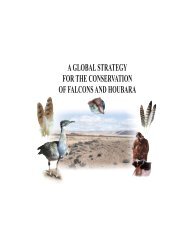Falco cherrug - International Wildlife Consultants Ltd.
Falco cherrug - International Wildlife Consultants Ltd.
Falco cherrug - International Wildlife Consultants Ltd.
You also want an ePaper? Increase the reach of your titles
YUMPU automatically turns print PDFs into web optimized ePapers that Google loves.
Guest Editorial<br />
Poisons seem to be the issue of concern at the<br />
moment. In Mongolia the widespread use of bromdialone to<br />
control plagues of Brandt’s Vole on the steppe has killed<br />
large numbers of Sakers, Upland Buzzards, Steppe Eagles<br />
and Cranes, as well as mammalian predators and even some<br />
children. The Mongolian Saker surveying team recorded a<br />
drop off of 27% of overall Saker population in Mongolia in<br />
2003. This has had more impact than all the illegal trapping<br />
and other factors put together. We have provided data and<br />
photos and made representations via various routes but it is<br />
hard to make much headway. There are no trained biologists<br />
in the Ministry of the Environment and with an election<br />
coming up in May, all funding and resources have been<br />
diverted to campaigning. It is hard not to be cynical.<br />
Meanwhile in the Indian sub-continent, a determined<br />
effort by various NGOs has enabled the sampling of<br />
a number of dead vultures and trials by Dr Lindsay Oaks<br />
have concluded that the culprit is diclofenac. This is a nonsteroidal<br />
anti-inflammatory drug recently introduced for use<br />
on farm mammals and humans. The problem is that even in<br />
low doses it causes secondary poisoning of vultures through<br />
kidney failure. The species affected are the Indian Whitebacked<br />
Vulture Gyps bengalensis, the Long-billed Vulture<br />
G. indicus and the Slender-billed Vulture G. tenuirostris.<br />
These last two have only recently been recognised as separate<br />
species. Over the last four years or so the Peregrine<br />
Fund has spent a million dollars investigating the problem<br />
and documented a 95% decline in the vulture populations.<br />
In early February 2004 a Summit Conference was hosted in<br />
Kathmandu by the Nepal Conservation Society. This was<br />
attended by delegates from various NGOs, including the<br />
Peregrine Fund, Birdlife, the RSPB, the Ornithological<br />
Society of Pakistan and the Bombay Natural History<br />
Society and from GOs from Nepal, Pakistan, India and<br />
ERWDA for the UAE. It was agreed that emergency action<br />
is needed to remove remaining vultures from the wild into<br />
safe holding pens and then later into breeding programmes<br />
pending the environment being cleaned of diclofenac. In a<br />
subsequent meeting in Abu Dhabi preparations were agreed<br />
to capture and transfer vultures from Pakistan to UAE for<br />
temporary safe-keeping.<br />
Following the CITES meeting on Sakers in Abu<br />
Dhabi last September another, larger, meeting is planned in<br />
UAE hosted by ERWDA for the CITES Secretariat. This<br />
will be on The <strong>International</strong> Trade in <strong>Falco</strong>ns. There have<br />
been problems raising the funding for it but at the moment<br />
it is scheduled for May. It will deal with issues of monitoring<br />
and enforcement of trade in wild falcons from the range<br />
countries, and problems in implementing CITES in managing<br />
a sustainable trade in captive-bred falcons. At present,<br />
the trade in wild birds seems to be almost impossible to control,<br />
whereas the captive-bred birds are being over-controlled<br />
to the point where CITES regulations are hindering<br />
this supply. Unless the wild-bird trade can be effectively<br />
controlled (which seems unlikely), the captive-bred birds<br />
are the only hope of offsetting the market demand.<br />
Nick Fox<br />
S. Gombobataar<br />
An officer of the Mongolian Ministry of Nature and<br />
Environment examines a poisoned Saker <strong>Falco</strong>n.<br />
2



